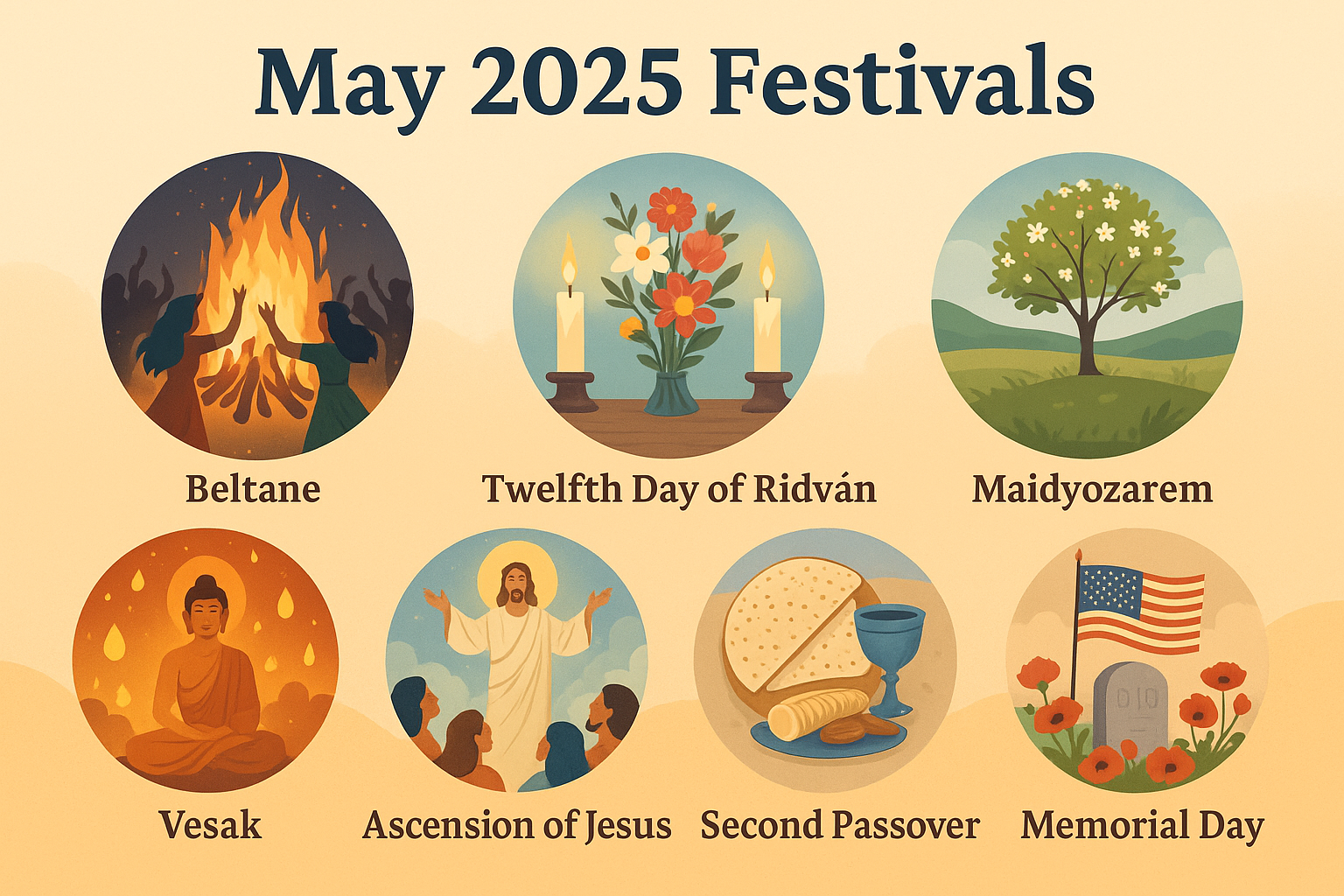
Embracing May 2025 Festivals: A Time for Unity and Celebration
While April was rich with multi-faith festivities, May 2025 offers a more serene pace—yet still includes meaningful celebrations across various traditions. Whether you’re in an interfaith relationship or simply curious about global cultures, these festivals are perfect for experiencing unity, family, and spiritual joy.
Understanding and celebrating each other’s traditions doesn’t require compromising your beliefs. Instead, you can engage in the cultural aspects of these festivals—like food, music, and community—while respecting spiritual boundaries. By doing so, you promote mutual respect, harmony, and interfaith understanding.
🗓️ For a full overview of previous months:
May 2025 Festivals Explained: Meaning & Relevance for Interfaith Couples
🌿 May 1, 2025 – Wiccan: Beltane – Fertility Festival
Beltane is one of the most joyful festivals on the Wiccan calendar, celebrating fertility, fire, and the vibrant renewal of life. Rooted in ancient Celtic traditions, this festival marks the midway point between the spring equinox and summer solstice. Celebrants light bonfires, dance around maypoles, and participate in symbolic rituals honoring the earth’s fertility. For interfaith couples, Beltane offers a unique cultural experience that focuses on nature, passion, and abundance—values that transcend spiritual boundaries. Even if you don’t identify as Wiccan, participating in a May Day celebration or a nature hike together can help you appreciate the festival’s universal message: new beginnings and the power of love.
🕊️ May 1, 2025 – Bahá’í: Twelfth Day of Ridván
The Twelfth Day of Ridván concludes the Bahá’í Faith’s holiest festival, commemorating the twelve-day period when Bahá’u’lláh declared his divine mission in the Garden of Ridván. This final day is one of three Bahá’í holy days on which work is suspended, and it’s typically marked by community gatherings filled with joyful prayer, music, and feasts. For interfaith families, this is a beautiful opportunity to honor unity and peace, two central tenets of the Bahá’í Faith that resonate across religious and philosophical lines. Sharing in this day, whether through a community gathering or a quiet moment of reflection, nurtures mutual respect.
🔥 May 4, 2025 – Zoroastrian: Maidyozarem – Mid-Spring Festival
Maidyozarem is a seasonal celebration within Zoroastrianism that marks the middle of spring, emphasizing purity, renewal, and harmony with nature. Zoroastrians honor the seasonal change with prayers, house cleaning, and often sharing meals with loved ones. While less known outside the faith, this mid-spring festival parallels springtime themes celebrated in many religions—growth, balance, and light overcoming darkness. Interfaith couples can find common ground in its environmental values, making it a great time to plant a garden, go on a nature walk, or prepare a meal inspired by Persian cuisine.
🌕 May 12, 2025 – Buddhism: Vesak – Buddha Day
Vesak, also known as Buddha Day, is the most sacred day in Buddhism, commemorating the birth, enlightenment, and passing of Siddhartha Gautama, the Buddha. Celebrated by millions around the world, this festival is filled with acts of kindness, meditation, temple visits, and candlelit processions. For interfaith couples, Vesak presents a powerful opportunity to embrace mindfulness and compassion. Even without participating in rituals, you can observe the day through meditation, giving to charity, or attending a local cultural event. The emphasis on inner peace and global harmony aligns beautifully with modern spiritual values.
🍷 May 12, 2025 – Judaism: Second Passover (Pesach Sheni)
Pesach Sheni, or Second Passover, offers a second chance for those who were unable to observe the main Passover due to distance, impurity, or other constraints. Rooted in themes of inclusion and redemption, this minor Jewish holiday reminds us that spiritual opportunities are never lost. It’s marked with a symbolic meal including matzah and bitter herbs, but without the full rituals of the original Seder. For interfaith couples, it provides an opening to understand and participate in Jewish traditions without pressure, reinforcing the idea that flexibility and grace are part of every faith journey.
📜 May 23, 2025 – Bahá’í: Declaration of the Báb
This Bahá’í holy day commemorates the moment the Báb, the forerunner to Bahá’u’lláh, first revealed his mission in 1844. It’s a day celebrated with joyful reverence, spiritual storytelling, and music. The Declaration of the Báb is significant because it emphasizes hope, new beginnings, and spiritual awakening, which are universal themes. Interfaith couples can celebrate by learning about the roots of the Bahá’í Faith or attending a local or online devotional gathering. The message of divine renewal makes it a meaningful occasion for deepening your shared spiritual journey.
🇺🇸 May 26, 2025 – Civil (U.S.): Memorial Day
Memorial Day is a national holiday in the United States dedicated to honoring those who died in military service. While secular in nature, it carries deep emotional and communal significance. Families gather for parades, cemetery visits, and barbecues. It’s also a time to reflect on freedom, sacrifice, and the cost of peace. For interfaith or intercultural families, Memorial Day is a neutral yet powerful moment to discuss shared values of service, remembrance, and gratitude, uniting people across backgrounds in collective appreciation.
🌟 May 28, 2025 – Bahá’í: Accession of Bahá’u’lláh
The Accession of Bahá’u’lláh marks the passing of Bahá’u’lláh and his spiritual succession. It’s a solemn yet inspirational observance, where Bahá’ís gather to read sacred texts and reflect on his teachings of unity, justice, and peace. For interfaith couples, this day serves as a reminder of how spiritual legacies influence global harmony. You don’t need to follow Bahá’í beliefs to participate in a thoughtful discussion about visionary leaders and their impact on humanity.
🕊️ May 29, 2025 – Christianity: Ascension of Jesus
Observed 40 days after Easter, the Ascension of Jesus commemorates Christ’s return to heaven, marking the completion of his earthly ministry. It’s an important part of the Christian narrative and is celebrated through church services, hymns, and scripture readings. Even in interfaith settings, Ascension Day can serve as a symbol of hope, transcendence, and purpose. Whether attending a service or simply discussing the meaning of spiritual elevation, it can lead to meaningful cross-faith dialogue.
🛡️ May 30, 2025 – Sikh: Martyrdom of Guru Arjan Dev Sahib
This solemn day honors the martyrdom of Guru Arjan Dev, the fifth Sikh Guru who stood for religious freedom and equality, refusing to convert under persecution. Sikhs commemorate his sacrifice with kirtan (devotional singing), readings from the Guru Granth Sahib, and by offering chilled rosewater drinks as a symbol of his endurance under torture. This festival is particularly resonant for interfaith couples who cherish justice, dignity, and the right to believe freely. Attending a Gurdwara or learning about Sikh history can make this a powerful moment of reflection and solidarity.
The Interfaith Perspective: Finding Unity in Diversity
No matter if you’re atheist, Bahá’í, Buddhist, Christian, Hindu, Jain, Jewish, Muslim, Native American, Pagan, Shinto, Sikh, Wiccan, or Zoroastrian, May’s spiritual calendar offers something meaningful for everyone.
For interfaith couples and families, these festivals become rich opportunities to:
- Share and learn from diverse traditions
- Host inclusive celebrations with cultural dishes
- Embrace universal values like love, renewal, and remembrance
The core of these events is community, storytelling, and gratitude—values that transcend religion.
Frequently Asked Questions (FAQs)
1. Can I celebrate a religious festival if I don’t belong to that faith?
Yes. Many festivals have cultural aspects like food, music, and storytelling that anyone can enjoy without engaging in religious practices.
2. What’s the best way for interfaith couples to observe these festivals?
Start by learning together, then decide how to engage in ways that honor both traditions—through meals, music, rituals, or reflection.
3. Are these festivals all religious?
Most are religious, but some, like Memorial Day, are civil in nature and carry universal themes of remembrance and gratitude.
4. Why are there multiple Bahá’í festivals in May?
The Bahá’í calendar places many key events during spring, aligning with themes of spiritual renewal and revelation.
5. How can we include children in interfaith festival celebrations?
Use festivals as teaching moments—through crafts, stories, songs, and food—to instill respect for all beliefs from a young age.
6. Is it okay to participate in just the cultural parts of a festival?
Absolutely. Many people focus on the social and cultural elements while opting out of religious observances.
About the Author
Dr. Ghouse is an Interfaith Wedding Officiant for InterfaithMarriages.org and a Muslim Wedding Officiant. He is a Muslim, Pluralist, activist, speaker, author, and social scientist. He is the President and founder of the Center for Pluralism and director of the World Muslim Congress. More on- Google

